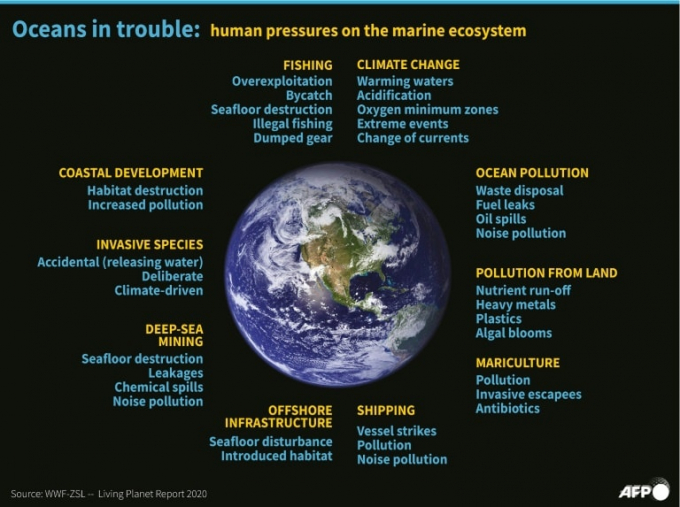May 26, 2025 | 16:51 GMT +7
May 26, 2025 | 16:51 GMT +7
Hotline: 0913.378.918
May 26, 2025 | 16:51 GMT +7
Hotline: 0913.378.918

Oceans in trouble. Photo: AFP/Emmanuelle Michel
"Today we face what I would call an ocean emergency," UN Secretary-General Antonio Guterres told thousands of policymakers, experts and advocates at the opening plenary, describing how seas have been hammered by climate change and pollution.
Humanity depends on healthy oceans.
They generate 50 per cent of the oxygen we breathe and provide essential protein and nutrients to billions of people every day.
Covering 70 per cent of Earth's surface, oceans have also softened the impact of climate change for life on land.
But at a terrible cost.
Absorbing around a quarter of CO2 pollution - even as emissions increased by half over the last 60 years - has turned seawater acidic, threatening aquatic food chains and the ocean's capacity to absorb carbon.
And soaking up more than 90 per cent of the excess heat from global warming has spawned massive marine heatwaves that are killing off precious coral reefs and expanding dead zones bereft of oxygen.
"We have only begun to understand the extent to which climate change is going to wreak havoc on ocean health," said Charlotte de Fontaubert, the World Bank's global lead for the blue economy.
Making things worse is an unending torrent of pollution, including a garbage truck's worth of plastic every minute, according to the United Nations Environment Programme (UNEP).
On current trends, yearly plastic waste will nearly triple to one billion tonnes by 2060, according to a recent report by the Organisation for Economic Cooperation and Development (OECD).
WILD FISH STOCKS
Microplastics - now found inside Arctic ice and fish in the ocean's deepest trenches - are estimated to kill more than a million seabirds and over 100,000 marine mammals each year.
Solutions on the table range from recycling to global caps on plastic production.
Global fisheries will also be in the spotlight during the five-day UN Ocean Conference, originally slated for April 2020 and jointly hosted by Portugal and Kenya.
"At least one-third of wild fish stocks are overfished and less than 10 per cent of the ocean is protected," Kathryn Matthews, chief scientist for US-based NGO Oceana, told AFP.
"Destructive and illegal fishing vessels operate with impunity in many coastal waters and on the high seas."
One culprit is nearly US$35 billion in subsidies. Baby steps taken last week by the World Trade Organization (WTO) to reduce handouts to the industry will hardly make a dent, experts said.
The conference will also see a push for a moratorium on deep-sea mining of rare metals needed for a boom in electric vehicle battery construction.
Scientists say poorly understood seabed ecosystems are fragile and could take decades or longer to heal once disrupted.
Another major focus will be "blue food", the new watchword for ensuring that marine harvests from all sources - wild caught and farmed - are sustainable and socially responsible.
PROTECTED AREAS
Aquaculture yields - from salmon and tuna to shellfish and algae - have grown by 3 per cent a year for decades and are on track to overtake wild marine harvests that peaked in the 1990s, with each producing roughly 100 million tonnes per year.
The Lisbon meeting will be attended by ministers and even a few heads of state, including French President Emmanuel Macron, but is not a formal negotiating session.
But participants will push for a strong oceans agenda at two critical summits later this year - the COP27 UN climate talks in November, hosted by Egypt, followed by the long-delayed COP15 UN biodiversity negotiations, recently moved from China to Montreal.
Oceans are already at the heart of a draft treaty tasked with halting what many scientists fear is the first "mass extinction" event in 65 million years. A cornerstone provision would designate 30 per cent of the planet's land and ocean as protected areas.
But preparatory negotiations in Nairobi ended on Sunday in deadlock.
"The agreement is at risk of collapsing on the question of finance," the environmental diplomacy lead for WWF France told AFP.
For climate change, the focus will be on carbon sequestration - boosting the ocean's capacity to soak up CO2, whether by enhancing natural sinks such as mangroves or through geoengineering schemes.
At the same time, scientists warn, a drastic reduction in greenhouse gases is needed to restore ocean health.
(AFP)

(VAN) Alt Carbon has raised $12 million in a seed round as it plans to scale its carbon dioxide removal work in the South Asian nation.

(VAN) Attempts to bring down the price of the Japanese staple have had little effect amid a cost-of-living crisis.

(VAN) Fourth most important food crop in peril as Latin America and Caribbean suffer from slow-onset climate disaster.

(VAN) Shifting market dynamics and the noise around new legislation has propelled Trouw Nutrition’s research around early life nutrition in poultry. Today, it continues to be a key area of research.

(VAN) India is concerned about its food security and the livelihoods of its farmers if more US food imports are allowed.

(VAN) FAO's Director-General emphasises the need to work together to transform agrifood systems.

(VAN) Europe is facing its worst outbreak of foot-and-mouth since the start of the century.